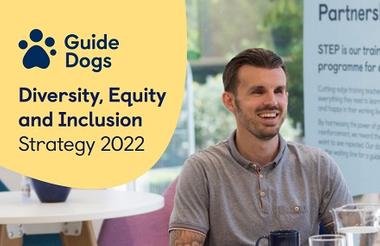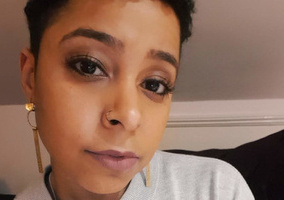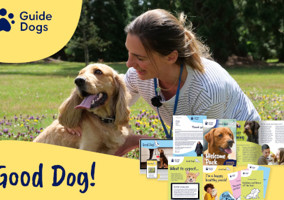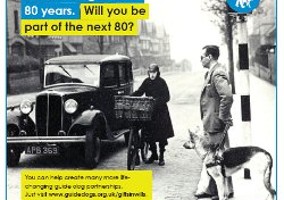Sight loss charity Guide Dogs has pledged to improve working conditions for vision impaired staff, acknowledging that their experiences have not always been positive.
Its diversity, equity and inclusion (DEI) strategy, published today as a PDF or audio file for vision impaired people, says the organisation will refresh its recruitment and onboarding processes and improving the accessibility of its digital environments.
The charity, which last year had an annual income of £125m, has committed to develop policies on menopause, baby loss, parental leave and trans inclusion as part of its strategy.
Its strategy shows that the charity’s gender pay gap is 13%, which is 5.1 percentage points higher than the national average, which it says is due to a “large population of women employed in our lower paid roles”.
Focus on vision impaired staff
Some 2.6% of the charity’s staff are vision impaired, according to the strategy, while 8.6% are disabled.
“Guide Dogs recognises the value of staff who are vision impaired in shaping the organisation,” the strategy reads.
“Crucially, we recognise that their experience of working here hasn’t always been positive. We recognise our built and digital environments, processes and culture has and can be disabling.”
Guide Dogs wants to change this, it says, and has pledged to ensure accessibility is considered in all its environments. This includes empowering visually impaired staff and developing a vision impairment awareness training session which will be compulsory for all staff.
The strategy states it has also listened to its colleagues with vision impairments and made many of the changes they needed. This included the recruitment of an access to work coordinator, the creation of two new assistive technology roles, recruiting a head of accessibility and compulsory training for everyone on creating accessible documents.
Guide Dogs has already delivered cultural awareness training for all its staff and volunteers and started networks for LGBT+, disabled and other workers.
Amanda Bennett, the DEI lead at Guide Dogs, said at the Charity Finance Group’s annual conference last month that she had often seen charities use two documents, one being labelled as accessible and the other not.
“Why not just have one that everyone can access?” she said.
A co-produced strategy
Tom Wright, chief executive of Guide Dogs, said: “I’m proud that we have co-produced this document with members of our staff networks and their allies.
“We’ve asked from cross the organisation about their experiences and what is important to them, as we set out the diversity, equity and inclusion roadmap or the next three years.
“I fully endorse this strategy and as a leader I’m building an inclusive culture, with a strong sense of belonging and togetherness.”
Related articles












